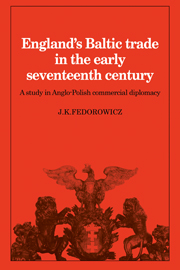 England's Baltic Trade in the Early Seventeenth Century
England's Baltic Trade in the Early Seventeenth Century Book contents
- Frontmatter
- Contents
- Preface
- List of maps and graphs
- List of abbreviations
- Map
- Introduction
- 1 English perceptions of the Polish Commonwealth
- 2 The mechanics of English diplomacy in the Eastland
- 3 The early history of the Eastland Staple at Elbing
- 4 The operation of the staple
- 5 The pattern of English shipping into the Baltic
- 6 English exports to the Baltic
- 7 English imports from the Baltic
- 8 The threat to the Eastland Staple at Elbing
- 9 The depression of 1620 and the crisis of England's Baltic trade
- 10 The political crisis, 1620–9
- 11 The mission of Sir Thomas Roe to the Eastland
- 12 Attempts at reconciliation with Danzig, 1630–5
- 13 The climax of English commercial diplomacy, 1635–42
- 14 Conclusion
- Notes
- Bibliography
- Index
2 - The mechanics of English diplomacy in the Eastland
Published online by Cambridge University Press: 05 November 2011
- Frontmatter
- Contents
- Preface
- List of maps and graphs
- List of abbreviations
- Map
- Introduction
- 1 English perceptions of the Polish Commonwealth
- 2 The mechanics of English diplomacy in the Eastland
- 3 The early history of the Eastland Staple at Elbing
- 4 The operation of the staple
- 5 The pattern of English shipping into the Baltic
- 6 English exports to the Baltic
- 7 English imports from the Baltic
- 8 The threat to the Eastland Staple at Elbing
- 9 The depression of 1620 and the crisis of England's Baltic trade
- 10 The political crisis, 1620–9
- 11 The mission of Sir Thomas Roe to the Eastland
- 12 Attempts at reconciliation with Danzig, 1630–5
- 13 The climax of English commercial diplomacy, 1635–42
- 14 Conclusion
- Notes
- Bibliography
- Index
Summary
The office and function of the royal agent
Despite the unquestioned significance of Hinton's contribution to the study of England's Baltic trade, several of his conclusions need re-evaluation in the light of new information. Perhaps the most important of these is his negative view of the efficacy of government support for the Eastland merchants and his categorical denial of the existence of permanent consular or ambassadorial representation in the Eastland. It is partially the purpose of the present study to modify these conclusions by demonstrating that such permanent diplomatic representation did indeed exist in Poland, in the person of the royal agent, and that this representation fulfilled the roles normally assigned to consuls or ambassadors, but at a substantially lower cost.
There is evidence for the existence of a royal agent in the Polish Commonwealth as early as 1538, though his description as ‘the King's merchant for Danske’ suggests a commercial role confined largely to the city of Danzig and not a political role in the Polish hinterland. The agent's duties involved supplying the king's ships with necessary commodities and this was the function performed by William Watson in the 1540s and 1550s. Apart from purchasing and the like, Watson was occasionally instructed by the Privy Council to procure supplies of rye and wheat for shipment to England during times of dearth. Interestingly enough, during this early period there may have been several individuals performing the functions of royal agent: Watson's naval purchases continued at least until 1558, but as early as 1551 another agent, John Borthwick, was ordered to obtain the release of English cloth seized in Danzig.
- Type
- Chapter
- Information
- England's Baltic Trade in the Early Seventeenth CenturyA Study in Anglo-Polish Commercial Diplomacy, pp. 14 - 33Publisher: Cambridge University PressPrint publication year: 1980


